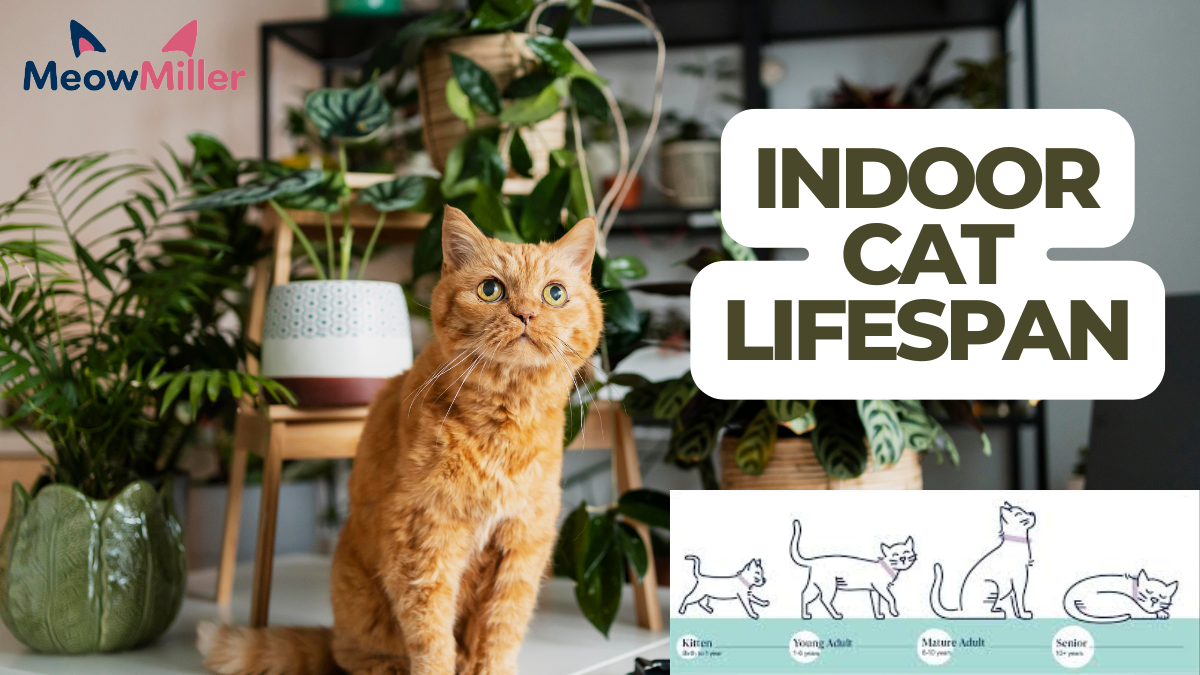I have always been intrigued with the possible lifetime of cats, especially when they are kept indoors. Since my home shares space with a feline friend, I’ve spent a considerable amount of time reading about the best ways to help my cat live as long and happily as possible. Let’s get started and share what we know about indoor cats, the factors influencing them, and what we can do to ensure our cats are thriving.
How Long Do Indoor Cats Live?
Indoor cats live much longer than outdoor cats. The average lifespan for an indoor cat is between 12 and 18 years, and many have reached their early twenties with the right care. The oldest known cat was 38 years old, named Creme Puff; this gives me hope that, with the proper care, my cat can be long-lived as well.
Keeping cats indoors reduces their exposure to risks such as traffic accidents, dog attacks, and diseases that outdoor cats are more likely to encounter. This safe environment contributes greatly to their longer lifespan.
Factors That Affect an Indoor Cat’s Lifespan
A cat’s lifespan isn’t just about whether it stays indoors. Other factors also play an important role, and understanding them can help us give our cats the best possible care.
Diet and Nutrition
One thing I have learned is that what we feed our cats has a huge impact on their health. Cats need a balanced diet that provides all the essential nutrients for their age and activity level.
| Cat’s Age | Recommended Diet |
| Kitten (0-1 year) | High-calorie food with extra protein |
| Adult (1-7 years) | Balanced food for maintenance |
| Senior (7+ years) | Easily digestible food with joint support |
Giving your cat high-quality food and fresh water every day is important. Do not give them too many treats because obesity can shorten their lifespan.
Regular Veterinary Care
I make sure to take my cat to the vet at least once a year. This can help diagnose possible health problems before they worsen. There is also the need for vaccination, parasite control, and dental care. It was when my cat had that small dental issue that, if taken care of earlier, made a huge difference in her comfort and health.
Mental and Physical Stimulation
Indoor cats do not receive the same exercise or stimulation as outdoor ones, so one has to keep such animals active. I play with my cat every day, using toys such as feather wands or laser pointers. That helps keep her fit and prevents boredom.
Providing an activity-inciting environment is equally important. Cats love scratching posts, climbing trees, and puzzle feeders. These activities keep their minds sharp and reduce stress.
Stress-Free Environment
Cats are sensitive animals, and a stressful home can impact their health. I try to keep my home calm and provide quiet spaces where my cat can relax. If you have other pets or children, it’s important to make sure your cat has a safe area to retreat to when needed.
Common Health Issues in Indoor Cats
As cats age, they may develop health issues. Knowing what to watch for can help us provide better care.
Dental Disease
One of the most common problems I’ve encountered with my cat is dental disease. Regular brushing and dental treats can help, but it’s also important to have a vet check their teeth during annual visits.
Obesity
Indoor cats are more prone to obesity because they are not as active as outdoor cats. Feeding the correct amount of food and playing with your cats daily will prevent obesity.
Arthritis
As cats get older, they get arthritic. My cat used to hesitate to jump on the furniture, which would have been a warning sign. Soft bedding and ramps should be provided to ensure easy existence for aging cats.
Kidney Disease
Kidney problems are common in older cats. Symptoms include increased thirst and urination. Early diagnosis and treatment can improve their quality of life.
FAQs
Q1. How Can I Help My Indoor Cat Live Longer?
Ans. You can help your cat live a long life by providing a balanced diet, regular vet care, and plenty of mental and physical stimulation. Keeping their weight in check and providing a stress-free environment are also key.
Q2. Do Indoor Cats Need Vaccinations?
Ans. They will still need a vaccination since your indoor cat might be exposed by an open window, other pet, or just on our clothes and shoes. Regular vaccinations safeguard them from contracting illnesses.
Q3. How Often Should You Take Your Cat to the Veterinarian?
Ans. Adult cats should have at least a check-up by a vet at least once every year. Some seniors or pets that are health-challenged will need frequent visits to a vet. The best routine is for proper diagnosis early.
Q4. Do Indoor Cats Get Depressed?
Ans. Because without proper stimulation, indoor cats become bored and sometimes depressed. It’s just providing toys, scratching posts, and interactive games with your kitty, which would make them quite happy and engaging.
Conclusion
Proper nutrition, regular veterinary care, and a loving environment are sure to ensure our cats live long, healthy lives. I learned that even the smallest changes, such as adding more playtime or investing in a scratching post, can make a huge difference in my cat’s happiness and well-being.
If you are like me and want to give your feline friend the best life possible, remember that love and attention go a long way. Every purr and head bump is a reminder that the care we provide helps them thrive. Let’s do everything we can to ensure our cats enjoy their golden years to the fullest.

